Roger Crowley's Blog, page 4
January 17, 2015
Shakespear of Arabia
I was fascinated by a story on the BBC today about this man, Captain William Shakespear (no 'e') - the Lawrence of Arabia before Lawrence - proper looking British army officer, fluent Arabic speaker and photographer.

Shakespear was in the Arabian desert before the First World War, living with the Bedouin, hunting with hawks, forging a British alliance with Ibn Saud, head of the House of Saud, against the Ottomans, mapping the desert - and photographing it.
He left a remarkable legacy of pictures.
In 1914, with the outbreak of war, the stakes in the Arabian peninsula were raised. The British were keen to work with Ibn Saud to drive the Ottomans out, but Shakespear was shot dead during a battle between Ibn Saud and an Ottoman backed rival - whilst trying to take photographs - an early casualty of war photography, and perhaps the man who could have inherited the fame that passed to Lawrence of Arabia had he lived. Read the full story here.
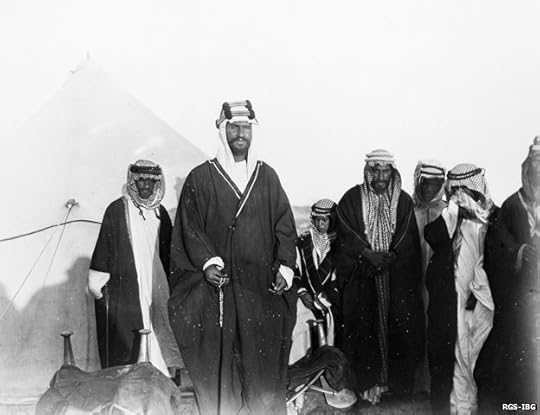 Ibn Saud and his followers
Ibn Saud and his followers
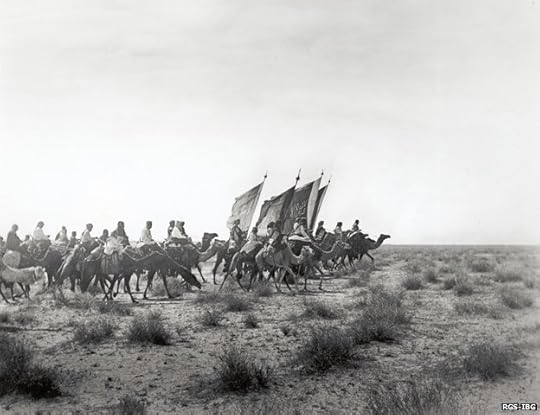 Ibn Saud's army on the march
Ibn Saud's army on the march

Shakespear was in the Arabian desert before the First World War, living with the Bedouin, hunting with hawks, forging a British alliance with Ibn Saud, head of the House of Saud, against the Ottomans, mapping the desert - and photographing it.
He left a remarkable legacy of pictures.
In 1914, with the outbreak of war, the stakes in the Arabian peninsula were raised. The British were keen to work with Ibn Saud to drive the Ottomans out, but Shakespear was shot dead during a battle between Ibn Saud and an Ottoman backed rival - whilst trying to take photographs - an early casualty of war photography, and perhaps the man who could have inherited the fame that passed to Lawrence of Arabia had he lived. Read the full story here.
 Ibn Saud and his followers
Ibn Saud and his followers
 Ibn Saud's army on the march
Ibn Saud's army on the march
Published on January 17, 2015 09:17
January 5, 2015
The blog in hibernation
I'm shocked how long the blog has been in hibernation over the past few months, whilst book finishing goes on. I have, at last, a finished, edited manuscript, I also have a title - 'Conquerors: How Portugal seized the Indian Ocean and forged the First Global Empire' - perhaps slightly different in the US, and I have a publication date, at least in the UK - for September.
Early starts have given me the chance to see the winter dawn coming up over the frosty Gloucestershire hills...I'm very much a morning writer, hopeless at night:

And I managed an interview with Shanghai Review of Books (in English I hasten to add), as my books have been translated into Chinese recently. In the process they reproduced my photo in flatteringly remastered form and looking mysteriously benign - though I'm not sure about the plastic silver wig.
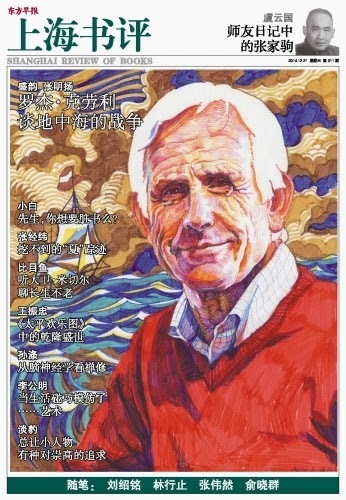 And I hope to crank the blog up properly again soon. Happy New Year.
And I hope to crank the blog up properly again soon. Happy New Year.
Early starts have given me the chance to see the winter dawn coming up over the frosty Gloucestershire hills...I'm very much a morning writer, hopeless at night:

And I managed an interview with Shanghai Review of Books (in English I hasten to add), as my books have been translated into Chinese recently. In the process they reproduced my photo in flatteringly remastered form and looking mysteriously benign - though I'm not sure about the plastic silver wig.
 And I hope to crank the blog up properly again soon. Happy New Year.
And I hope to crank the blog up properly again soon. Happy New Year.
Published on January 05, 2015 02:09
September 24, 2014
'We are watching in awe and deep emotion'
The blog has been silent for a while, whilst I hurtle to the finishing line on a book. I've now sent the manuscript off to the publishers and am enjoying a short lull before they remind me of all the things I have not supplied - bibliographies, source notes, map briefings etc etc. For the past three years I've been living with the deeds of the Portuguese in the Indian Ocean. The first people to establish a sea route to India, and the first conquistadors. It's been a long and fascinating voyage for me too - leaving the Mediterranean for once for the seas beyond: a tale of ingenuity and endurance, sea battles and, at times, terrible brutality - all paving the way for the global world in which we live today.
Meanwhile, scanning the news, I've been fascinated by the discovery of a royal tomb in Greece, dating back to the time of Alexander the Great, that has temporarily distracted the Greeks from their modern woes:
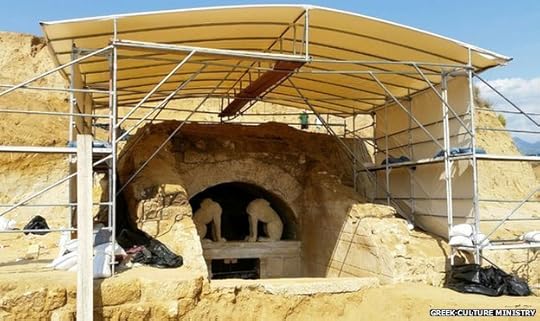
As the archaeologists patiently burrow their way into an extraordinary mausoleum, the Greeks dream that it's the tomb of Alexander himself and the nation holds its breath: "We are watching in awe and with deep emotion the excavation in Amphipolis,"said the Greek culture minister. You can read the story here.
Meanwhile, scanning the news, I've been fascinated by the discovery of a royal tomb in Greece, dating back to the time of Alexander the Great, that has temporarily distracted the Greeks from their modern woes:

As the archaeologists patiently burrow their way into an extraordinary mausoleum, the Greeks dream that it's the tomb of Alexander himself and the nation holds its breath: "We are watching in awe and with deep emotion the excavation in Amphipolis,"said the Greek culture minister. You can read the story here.
Published on September 24, 2014 10:03
August 4, 2014
Candles in the dark
 'The lights are going out all over Europe.' People in Britain have been asked to turn off their lights for an hour between 10 and 11pm this evening in memory of the time an exact century ago that the country declared war on Germany. And so I'm writing this by candlelight. It's a beautiful, tranquil August night here in the countryside, the moon clear in the sky, an atmospheric time to remember. And historians still seem unable to come to a consensus as to exactly why the people of Europe needed to churn their continent into the mud.
'The lights are going out all over Europe.' People in Britain have been asked to turn off their lights for an hour between 10 and 11pm this evening in memory of the time an exact century ago that the country declared war on Germany. And so I'm writing this by candlelight. It's a beautiful, tranquil August night here in the countryside, the moon clear in the sky, an atmospheric time to remember. And historians still seem unable to come to a consensus as to exactly why the people of Europe needed to churn their continent into the mud.
Published on August 04, 2014 14:43
July 20, 2014
Today Germany honours
This man:

The aristocratic Col Claus Schenk Graf von Stauffenberg. Today, at 12.30, seventy years ago, the one-armed, one-eyed von Stuaffenberg entered a meeting with Hitler at the Wolf's Lair, put a bulky black briefcase down on the table, and departed. He heard the explosion in the distance as he left the compound. He was certain that Hitler was dead.
It was just bad luck. The briefcase had been moved off the table. Four men were killed, but Hitler, shielded by the heavy table, survived the blast - though his trousers did not. I can't help thinking how big the trousers are beside the soldier holding them up. Did they find a particularly small man to display them or perhaps substituted another pair with faked lacerations to give the German public an idea of the enormous size of The Great Leader, and his invulnerability?
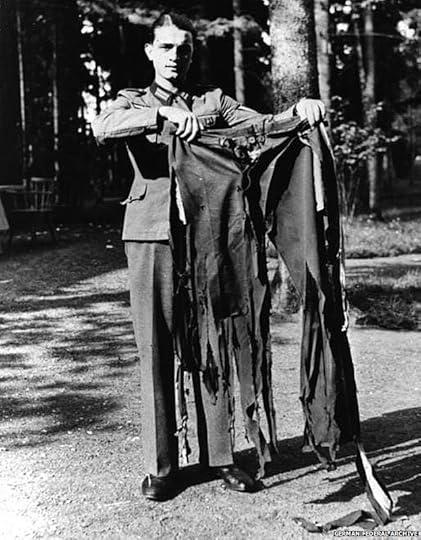
Von Stauffenberg, along with many others, was rounded up and shot. He was 36 years ago. The story here from the BBC which has been interviewing his son.

The aristocratic Col Claus Schenk Graf von Stauffenberg. Today, at 12.30, seventy years ago, the one-armed, one-eyed von Stuaffenberg entered a meeting with Hitler at the Wolf's Lair, put a bulky black briefcase down on the table, and departed. He heard the explosion in the distance as he left the compound. He was certain that Hitler was dead.
It was just bad luck. The briefcase had been moved off the table. Four men were killed, but Hitler, shielded by the heavy table, survived the blast - though his trousers did not. I can't help thinking how big the trousers are beside the soldier holding them up. Did they find a particularly small man to display them or perhaps substituted another pair with faked lacerations to give the German public an idea of the enormous size of The Great Leader, and his invulnerability?

Von Stauffenberg, along with many others, was rounded up and shot. He was 36 years ago. The story here from the BBC which has been interviewing his son.
Published on July 20, 2014 08:51
June 27, 2014
28 June 1914
A hundred years ago today two pistol shots that changed the world. On 28 June 1914 Gavrilo Princip and five other Serbian nationalists were lining the streets of Sarajevo, awaiting the arrival of Archduke Franz Ferdinand, heir to the throne of the Austro-Hungarian empire, who had come with his wife to open a hospital. They were armed with pistols and hand grenades and carried cyanide capsules. It was to be death or glory.
[image error]The Archduke and his wife arriving in Sarajevo on the fateful day
As the cortege passed, one of the conspirators hurled a hand grenade at the Archduke’s car. The grenade had a ten second delay on it; the chauffeur accelerated away, the grenade hit the fourth car, exploded and seriously wounded two of the dignitaries inside. The other conspirators were unable to react as the archduke’s car sped off. The attack had failed.
Later the archduke decided to visit the wounded in hospital. As the car made its way by another route, the chauffeur took a wrong turn. Realising his mistake, he attempted to back. The car stalled. It was about 10.45. By pure chance Princip was standing on the pavement by a café as the car ground to a halt. This was his moment. He stepped forward and pulled the trigger. At five feet it was impossible to miss. The first shot hit the Archduke in the neck. Princip took aim again – this time at the Austrian governor of Bosnia and Herzegovina – but members of the crowd were trying to grab him. The archduke’s wife had flung herself in front of her husband but was hit in the stomach as the second shot flew wide. The archduke lived long enough to murmur to his wife “Sophie, Sophie don't die, stay alive for our children." By 11 they were both dead.
Princip tried to swallow a cyanide capsule but it failed, and the pistol was wrested from his hand before he could shoot himself. He was hauled away:[image error]
Too young to be executed he died a lingering death from TB in prison in 1918, before the end of the war that the shot had launched, killing some 16 million others, including a quarter of all Serbians. The car, the pistol and the Archduke’s bloodstained shirt are in the Military Museum in Viennaand Princip is a Serbian national hero. I share my birthday with the date of his ‘lucky’ shot.
[image error]
Published on June 27, 2014 23:37
June 18, 2014
Big Seas
‘At the third gust the wind became so strong that it shattered our lateen yard down the middle, and snapped the Julia’s main mast. Great packets of sea rolled over us – it was stupefying to see.’ I’ve been writing about Vasco da Gama’s voyages to India – small ships lurching and rolling in the enormous seas south of the Cape of Good Hope; the Portuguese shipwreck statistics along the African coast and the total disappearance of vessels swallowed up by the ocean were alarming.
To get some further imaginative sense of what it would be like to confront the ferocity of really big seas in a sailing boat I picked up The Last Grain Race by Eric Newby. Newby, out for adventure as a nineteen year old, signed up as a sailor on the Moshulu, one of the last sailing ships to carry grain from Australia, just before the Second World War.
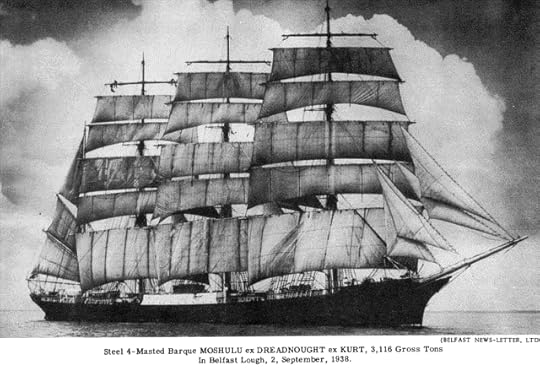
Here’s Newby’s account of heading for Cape Horn in the heaviest seas in the world:
“The barometer fell and fell, 746, 742, 737 millimetres. The sun went down astern, shedding a pale watery yellow light on the undersides of the deep black clouds hurrying above the ship. It was extremely cold, colder than it had ever been, blowing a strong gale, force 9. Big seas were coming aboard. I felt very lonely. The ship that had seemed huge and powerful was nothing now, a speck in the Great Southern Ocean, two thousand miles eastwards of New Zealand, three thousand from the coast of South America…to the south there was nothing but the Antarctic ice and darkness. She was running before seas that were being generated in the greatest expanse of open ocean, of a power and size unparalleled because there was no impediment to them as they drove eastwards round the world. She was made pigmy too by the wind, the wind that was already indescribable.
At this moment, for the first time I felt certain of the existence of an infinitely powerful and at the same time merciful god. Nearly everyone in the ship felt something of this, no one spoke of it. We were all of us awed by what we saw and heard beyond the common experience of men.”
The Portuguese have a proverb – if you want to learn to pray, go to sea.
Strangely the Moshulu still exists – she’s a floating restaurant in Philadelphia.
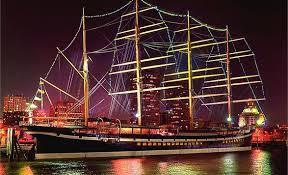
Published on June 18, 2014 13:31
May 21, 2014
Nicholas Winton's holiday
Few people could have put a holiday to better use than Nicholas Winton – I’ve been reading about him today. Winton, a 29 year old London stockbroker of Jewish origin, was about to go skiing in December 1938 when he received a phone call from a friend in Prague asking him to go and help Jewish refugees living in terrible conditions in camps. He went. He was appalled. He did something. In three weeks there he planned the mass evacuation of Jewish children, organized the paperwork and set about finding host families and money to bring them to Britain, and bullied British officialdom to act.
During the first half of 1939 Winton’s kindertransport managed to bring 669 children in eight trains to host families in Britain. The ninth, scheduled for 1 September 1939, never arrived. War had broken out. The children waiting eagerly at the Praguestation were spirited away. He remains haunted by the memory: "Within hours of the announcement, the train disappeared. None of the 250 children aboard was seen again. We had 250 families waiting at Liverpool Street that day in vain. If the train had been a day earlier, it would have come through. Not a single one of those children was heard of again, which is an awful feeling."
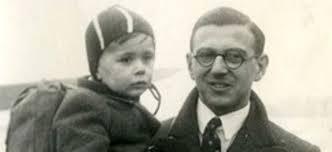 Winton with one of the evacuees
Winton with one of the evacueesAnd Winton went back to ordinary life and never talked about what he had done – not even to his wife. It would be fifty years before she stumbled on a scrapbook in the loft and the whole story came out. Since then it has been widely publicised and the children of this evacuation have been coming forward – as ‘Winton’s children’.
Here’s a snippet from a TV programme about a reunion with the now elderly children and their descendents. It’s a real tearjerker. Winton is still alive. He’s just been awarded the Czech Republic’s highest honour. He’s 105.
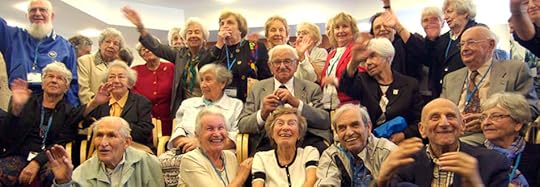
Winton with the children
Published on May 21, 2014 13:11
May 11, 2014
The Chapel of Bones
My Chinese publisher recently sent me this ghoulish picture of one of Malta's top nineteenth century tourist attractions: the Chapel of Bones in Valletta, reputed to be decorated with the neatly organised remains of those who died in the siege of Malta in 1565 - skulls round the arch and lined up in gawping rows beside the entrance, arm bones crossed like images from a pirate flag. The overall arrangement is quite a work of art. I didn't know about this when I was writing Empires of the Sea - and was grimly fascinated. But as the chapel was said to contain the remains of 33, 000 people it must have been an ossuary drawing on the remains of Maltese people over a much longer period.
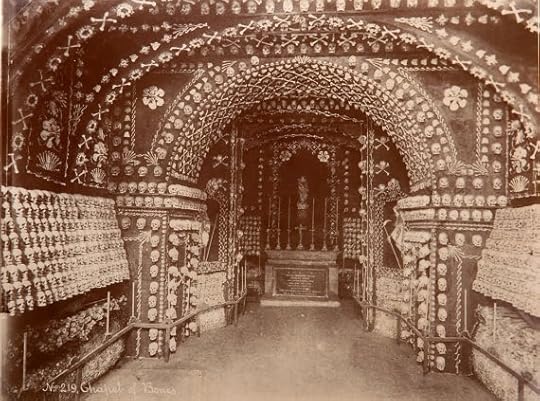
It was destroyed by a Luftwaffe bomb in the Second World War and is reputed to lie somewhere underground - waiting to be resurrected.
 Otranto, on the heel of Italy, has a similar monument to the dead in the Ottoman-Christian wars. The Cathedral of Bones embeds the remains of 800 defenders executed after the shock Ottoman invasion of 1480. What times...
Otranto, on the heel of Italy, has a similar monument to the dead in the Ottoman-Christian wars. The Cathedral of Bones embeds the remains of 800 defenders executed after the shock Ottoman invasion of 1480. What times...

It was destroyed by a Luftwaffe bomb in the Second World War and is reputed to lie somewhere underground - waiting to be resurrected.
 Otranto, on the heel of Italy, has a similar monument to the dead in the Ottoman-Christian wars. The Cathedral of Bones embeds the remains of 800 defenders executed after the shock Ottoman invasion of 1480. What times...
Otranto, on the heel of Italy, has a similar monument to the dead in the Ottoman-Christian wars. The Cathedral of Bones embeds the remains of 800 defenders executed after the shock Ottoman invasion of 1480. What times...
Published on May 11, 2014 04:23
April 3, 2014
A good man in Rwanda
Spare a few minutes for this moving report on Capt Mbaye Diagne, UN peacekeeper in Rwanda, described by the BBC's Mark Doyle as the 'the bravest man I ever met'.
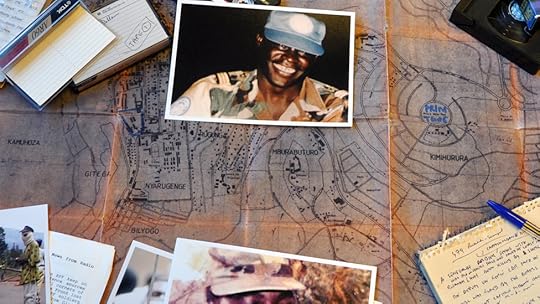

Published on April 03, 2014 05:12
Roger Crowley's Blog
- Roger Crowley's profile
- 820 followers
Roger Crowley isn't a Goodreads Author
(yet),
but they
do have a blog,
so here are some recent posts imported from
their feed.



